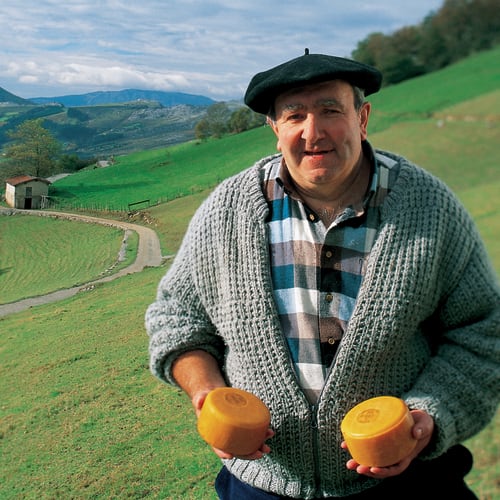Free Tuna with $75 Orders! Promo Code: TUNA
Ancient Traditions on the Brink
Jonathan Harris | May 2025




In 2000, my wife and I set out on the ancient Camino de Santiago pilgrimage route on our honeymoon. Most couples would prefer to spend their days on a sunny beach, enjoying a relaxing time with their new partner. However, my wife and I wanted an adventure exploring Spain. We had both lived in Spain as children—she in Catalunya and Madrid, and I in Andalucía—but we didn’t meet until twenty years later. We immediately bonded over our shared love of Spain and couldn’t wait to travel there together.

Hiking along country paths that meandered through the forests of Galicia, near the end of the Camino, we often came upon little stone villages. Though sparsely populated, these rural outposts still lived as farming communities, with the people tending cattle and sheep and farming small plots. As we took in the rustic stone dwellings, we could tell that these communities had persisted for centuries, carrying on the ancient traditions of the land. The paths near these villages were dotted with manure - so much so that we made up a marching song: “If you’re lost and you can’t find your way, follow the caca da vaca!”
It turns out that we were witnessing the very end of an era. The great migration of rural folk to cities like Madrid and Barcelona had begun decades earlier. The rustic villages that we walked through were occupied by the last holdouts, mostly elderly Spaniards who didn’t want to leave their way of life. Twenty-five years later, most of the rural settlements stand abandoned, with the crumbling stone houses standing as monuments to a different time. I imagine that even the manure on the path is a thing of the past!
It is easy for me to feel nostalgic for the old Spain and to feel regret for a fading way of life. But the reality is that I never had to rise at dawn to milk the cows or labor in the fields to eke out a meager living! In many ways, it is wonderful that Spain has become prosperous enough to provide opportunities for her people. But, with this epic change, many ancient traditions have come under threat.

There are many in Spain who are alarmed at the loss of ancient cultural treasures, especially among those care about artisan food ways. Decades of development and industrialization have threatened the amazing food traditions of Spain. This is a country with a dizzying variety of foods, including hundreds of small batch farmhouse cheeses, dozens of kinds of rustic cured sausages and many unique vegetables and fruit that grow slowly in specific microclimates or need to be carefully tended by hand. Modern alternatives keep knocking, tempting artisans with an easier life. Why grow a paella rice that takes twice as long to mature as industrial varieties? Why use the milk of local sheep that graze the fallow fields nearby when you can source cheaper commodity milk with ease?
Some foods are more threatened than others. The saffron farmers from La Mancha who grow fields of crocus flowers and pick them by hand can’t find workers to help. The cheesemakers of Cabrales, who age their powerful blue cheeses in mountain caves in Asturias, don’t have many people willing to work in the caves to tend and rotate the delicate cheeses.
European, national and regional governments have created programs to help. They have provided incentives for repopulating abandoned towns and villages. They have tried to recognize and protect special food traditions with designations such as the Denominación de Orígen Protegida (Protected Denomination of Origin), which create standards for and certify authenticity of regional food treasures.

Unfortunately, this is not enough to provide a sustainable future for Spain’s traditional foods. The farmers and herders who remain in the Spanish countryside are getting older, and the next generation is not as interested in rural life. As with many independent farmers around the world, they are just one searing drought, one untimely freeze or one destructive storm away from financial peril.
I have spoken with our suppliers about the challenges facing Spain’s artisan food ways, and many are working hard to find solutions. My friend Mikel works with dozens of small cheesemakers to provide us with our varied selection. He says that many farmers are tired of the hard work and uncertainty. Mikel says that some companies, including his, are starting to hire farmers and shepherds as employees to give them a more stable income. This is one way they are trying to ensure that quality milk is available for cheesemaking.
Despite the challenges, there are still hundreds of artisans across Spain’s seventeen regions who are dedicated to preserving their treasured local traditions. I am still impressed with the power of local pride, especially related to foods. And these intrepid producers have a powerful ally in food lovers, such as yourself, who appreciate Spain’s artisan products and are willing to pay a little more for the real thing.
Spain’s authentic food traditions and the families who preserve them are very important to us at La Tienda. We support these families by offering their foods on our website and in our catalog, providing another market for their creations. The word ‘artisan’ is used too much these days, but many of our suppliers really do tend their fields on foot, craft their foods by hand and take great pride in preserving their beloved local traditions. We need your help in supporting their work. Please resist the temptation to buy cheap grocery store alternatives to these artisan treasures. You, and your tastebuds, will be thankful you did.

¡Hola! I'm Jonathan Harris, one of the owners of La Tienda. I love sharing insights about Spain's amazing food culture.
Learn more >

